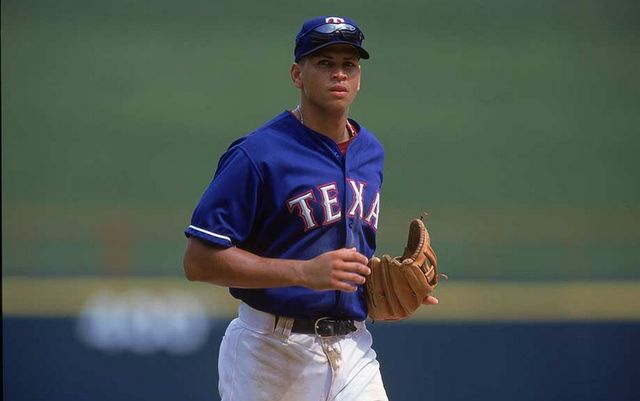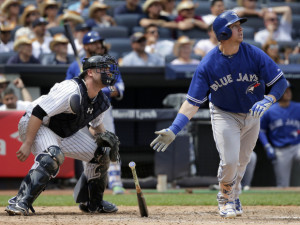
The headline above is a reference to a Sports Illustrated column of the same name that was published almost exactly three years ago. The article, written by S.L. Price, detailed how Yankees slugger Alex Rodriguez went from heralded prospect to superstar to steroid abuser to pathological liar. The line that stuck with me and many others in the first paragraph of that column: “But the end? The end is pain, and pain is ugly.”
Three years after “The Last Days of A-Rod” ran in SI, Alex Rodriguez has finally reached his painful end. It hasn’t been pretty.
In reality, the entire 2016 season has felt like one singular, massive dead end for Rodriguez; this dead end of his career has no cul-de-sac to turn around from, either. A career .295 hitter, A-Rod is hitting just .204 this year, tied for the lowest figure of his career. That career dates back to 1994, when he came up with the Mariners as an 18-year old wunderkind. The date of his debut, July 8, 1994, came just over a month before the MLB Players Association went on strike and effectively ended the ’94 season. That’s right, A-Rod’s emergence onto the baseball scene predated the most consequential sports work stoppage in recent memory. Now, he’s the only player left from that bygone era.
That changes this Friday. The team and Rodriguez called a sudden news conference at 11:00 AM on Sunday to make an announcement. No one knew what the announcement would be about, but many guessed it had to do with the next chapter of A-Rod’s career. Sure enough, that’s exactly what it was about: the team announced an agreement that would allow Rodriguez to play his final game on August 12 and remain with the team in an advisory role for the rest of this season and next year, as well. The somewhat shocking, abrupt end for A-Rod seems like an unjust conclusion to a career that saw him hit 696 home runs, rack up 3,114 hits, and drive in 2,084 runs.
But it isn’t an unjust end when you think about who we’re dealing with: an avowed and well-known steroid user who lied about his PED use on multiple occasions over the course of many years.
In 2007, Rodriguez was interviewed on 60 Minutes by then-CBS News anchor Katie Couric; she pressed him on his use of steroids and performance-enhancing drugs. Rodriguez flatly denied using PEDs and even went as far as saying that he “never felt overmatched on the baseball field”. In 2009, Sports Illustrated reported that Rodriguez had tested positive for several banned substances; however, there was, at that time, no punishment for a positive drug test. Because 5% of all players tested positive at some point in 2003, though, Major League Baseball undertook a new disciplinary system that enforced mandatory suspensions for positive drug tests. This system took effect in time for the 2004 season. Rodriguez was in the clear. Or so it seemed.
After the Sports Illustrated report, Rodriguez finally came clean about his steroid use. Calling himself “young, stupid, and naive,” Rodriguez admitted to ESPN that he had indeed been using steroids from 2001-2003, when he played for the Texas Rangers. He also cited pressure to perform under a 10-year, $252 million contract, one that was then the largest contract in the history of professional sports. As repulsive as Rodriguez’s cheating was, it was at least somewhat understandable as to why he would do such a thing. Think about it: player signs massive contract, feels pressure to live up to it, crumbles under that pressure, caves to using steroids. Okay, fair enough. Even with the denials and the lying and the naiveté, fair enough. It would surely be a mistake that Rodriguez would learn from and not make again in the future.
Except that wasn’t the case at all. Rodriguez failed us, the Yankees, and himself four years later. Again.
In early 2013, documents obtained by the Miami New Times linked Rodriguez and several other players (Nelson Cruz, Ryan Braun, Bartolo Colon, others) to a clinic in South Florida known as Biogenesis. MLB’s investigation into the matter spawned several 50-game suspensions, a 65-game suspension for Braun, and worst of all, a 211-game suspension for Rodriguez. In this situation, Rodriguez could have admitted guilt, cut his already enormous losses, and moved on with his prolonged exile with whatever reputation he had left. Instead, he did what he’s been doing for the past ten years: denied any wrongdoing even against a mountain of evidence to the contrary.
It went that way until shortly into 2014. On February 7 of that year, Rodriguez announced that he would be (mercifully) dropping all of his lawsuits against Major League Baseball in the Biogenesis matter. The concession of defeat in the case seemed to signify that A-Rod had finally run of legal options and could no longer pursue any more rulings in the court of law. He would serve his suspension for the 2014 season because he had finally reached checkmate.
In reality, February 7, 2014 marked a line of demarcation in Rodriguez’s career and, more importantly, his life. From then on, he changed, or at least he seemed to.
From that date forward, he seemed more humble, more contrite, and more giving of his time. He said in an interview with Tom Verducci that he was “happy and relaxed”, seemingly a far cry from feeling “enormous pressure to perform” in Texas. A-Rod was A-Rod as we’ve never seen him before, or at least not recently. He was happy again, having fun playing the game, and even making us forget about the years of steroid use, denial, and lies that predated his renaissance.
He was just different. He even went on TV for FOX during the MLB playoffs last season and he was…. good. Really good. His opinions on hitting and the game in general opened many viewers’ eyes to his baseball IQ, an aspect of his game that was overshadowed by his talent and, later, his fall from grace. He was even likable, consistently cracking self-deprecating jokes about his career and life in baseball. He even gave fellow disgraced legend Pete Rose this sage advice in the middle of a rain delay during Game 6 of the NLCS:
And, like I said earlier, he was really smart. He said before Game 1 of the World Series that if the Mets “catch the ball”, they would win the series. Sure enough, in the bottom of the first inning, this happened. Prescient analysis, indeed.
And that’s why his new role with the Yankees, as an adviser and special assistant, is just perfect for him. Very few people know the game quite like A-Rod does, and his ability to impart that knowledge to the Yankees’ young players could be critical in their development. It has been said multiple times that the Yankee players, and particularly the Latin players, adore Rodriguez, and there’s a reason why: the 40-year-old has become something of a father figure to them, giving them tips and advice that he’s learned over the course of 23 years in professional baseball.
This role for A-Rod is starkly different than the role he played in baseball for so many years. That role evolved over time. He started as a prodigy and then became a superstar, multi-millionaire, pariah, liar, pariah again, liar again, mentor, father figure, and, finally, legend. When it comes to the Hall of Fame, he has no chance of getting in; unlike Barry Bonds, Roger Clemens, Mark McGwire and others, Rodriguez actually failed multiple drug tests. The aforementioned names aren’t getting in the Hall anytime soon, and Rodriguez probably won’t ever get in. He has himself to blame for that omission, especially considering that he was headed for Hall of Fame numbers in the first seven years of his career with the Mariners. It is uncertain whether or not he would have kept up his production without PED assistance, but we’ll never know if he would have. That’s the shame of this.
Alex Rodriguez is many things to many people. He is one of the most polarizing athletes in sports, but he seems to have changed quite a bit since the early days of his career. Some changes have been for the better and others have been for the worse. He’s far from perfect and his reputation will never be saved with those who are unforgiving to steroid users.
But it’s hard not to acknowledge this: statistically, he’s one of the best hitters in the history of baseball. Consider this: for each 162-game season, Rodriguez has averaged 41 home runs, 121 RBI, 19 stolen bases, 78 walks, and 181 hits. Not bad at all.
That hitter, disgraced as he is, will soon leave us. We’ll never get the chance to watch him again after this Friday and his impact on the game, positive and negative, will live on for years to come.
Let’s cherish him, as his last days really are upon us and his departure from the game is imminent.


